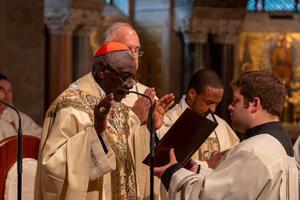A Catechism for Troubled Times
BOOK PICK: Cardinal Robert Sarah’s latest book, ‘Catechism of the Spiritual Life,’ firmly grasps the Church’s responsibility to the poor, as well as her monastic tradition.

CATECHISM OF THE SPIRITUAL LIFE
By Cardinal Robert Sarah
336 pages, $24.95
EWTN Publishing, 2022
To order: EWTNRC.com or (800) 854-6316
It’s a great consolation to read and write about Cardinal Robert Sarah so soon after the death of Pope Benedict XVI. Perhaps no other prelate has carried forward the intellectual legacy of Ratzinger/Benedict as much as he has.
Cardinal Sarah first came to the attention of Catholics in the U.S. with his book God or Nothing, which showed the Guinean prelate to be a strong voice for the Church’s Tradition and a keen observer of the current situation in the Church and the world. Like Ratzinger/Benedict, Cardinal Sarah is often caricatured as a reactionary controversialist. His incisive criticisms of Western culture and of certain forces in the Church make for good press. But they don’t accurately reflect the depth and breadth of his thought. Here is a man with a deep knowledge and appreciation for both his native African culture and the patrimony of Western Civilization. He firmly grasps the Church’s responsibility to the poor as well as her monastic tradition.
The recently published Catechism of the Spiritual Life is another wonderful contribution from Cardinal Sarah. It is, however, a hard work to describe. Yes, it is indeed a catechism. Cardinal Sarah dedicates each chapter to teaching a specific sacrament, with an additional chapter on prayer.
In addition to the doctrinal content are pious reflections that work more like spiritual reading than just catechesis. His ability to draw on the wealth of the Church Fathers, popes and other (less well known) theologians reveals how broadly read the cardinal is.
Further, and unlike any catechism that I’ve read, Catechism of the Spiritual Life also gives lengthy commentaries and analyses of the present situation in the Church and in the world. Yet these are not out of place. Cardinal Sarah explains how the doctrine of each sacrament both addresses and is threatened by our present circumstances.
Although unusual, this blend of doctrine, piety and analysis is a winning combination. Cardinal Sarah doesn’t describe a sacrament or teach about prayer in general. He situates those things in the here and now. His clear purpose is not merely to give a catechetical information about these things but to reflect on what they mean in our present circumstances — and how they form our response.
Conversely, the cardinal doesn’t just comment on current events. He does so in light of the spiritual life — which is the proper ordering of things. Vatican II observed, “the Church has always had the duty of scrutinizing the signs of the times and of interpreting them in the light of the Gospel” (Gaudium et Spes 4, emphasis added). Catholics currently err in one of two ways. On the one hand, some who happen to be Catholic comment on the times (often at length), but with observations that are more secular and political than Catholic. On the other hand, others, reversing Vatican II’s prescription, scrutinize and interpret the Gospel in the light of the times.
Cardinal Sarah addresses many of the scandals that beset the Church and the world: liturgical irreverence, doctrinal confusion, secularization of society, governmental overreach during COVID and so on. He doesn’t mince words in writing about these.
But his solution is the simple truth that always brings about reform: personal conversion. “The search for holiness must control our whole life.” This is a welcome relief from those Catholics who fall into the trap of thinking that the proper response to the problems of this world are the methods and means of the world.
Cardinal Sarah has the proper formula. The spiritual life comes first. Only with the supernatural outlook can one view our current circumstances accurately. Thus, one of the last chapters, “The Church and the Missions,” comes only after the cardinal has spent pages explaining and developing the spiritual life. Only within his reflections on the sacraments and prayer can one properly situate the state of affairs in the Church and in the world.
In contrast to those who allow our current woes to consume us, Cardinal Sarah understands the need for a deep and consistent spiritual life. That’s the purpose of this Catechism.
Our foes are not flesh and blood; and the Catholic who tries to address scandals, infidelity and apostasy by human strength will make a shipwreck of his faith. In the end, it’s really a book about the fundamentals of piety and the sacramental life. Those are prior to any controversy and the only sure response to them.
- Keywords:
- cardinal robert sarah
- sacramental life
- catechism
- christian living
- book picks
- ewtn publishing

















